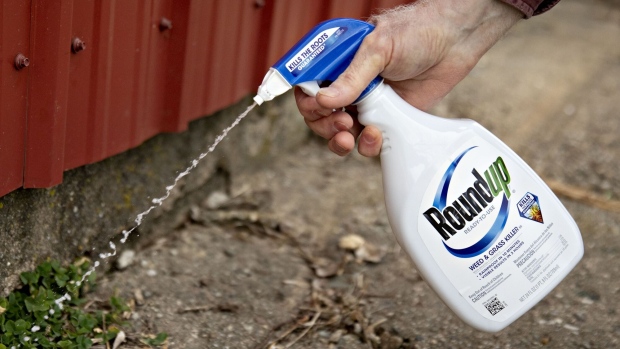Nov 18, 2023
Monsanto Ordered to Pay Over $1.5 Billion in Roundup Verdict
, Bloomberg News

(Bloomberg) -- Bayer AG’s Monsanto unit was ordered by a Missouri jury to pay more than $1.5 billion to three former users of its Roundup weedkiller who blamed their cancers on the controversial product in one of its largest trial losses in the five-year litigation over the herbicide.
Jurors in state court in Jefferson City, Missouri, late Friday awarded James Draeger, Valorie Gunther and Dan Anderson a total of $61.1 million in actual damages and $500 million each in punitive damages over their claims that years of using Roundup on their lawns and gardens caused their non-Hodgkin’s lymphomas.
Monsanto has been hit with a recent spate of jury verdicts finding its Roundup contains carcinogens after winning nine cases against it. The more than $1.5 billion verdict is one of the largest damage awards handed down against a US corporate defendant this year. A federal-court jury in Kansas City concluded Oct. 31 the National Association of Realtors and others conspired to artificially inflate commissions paid to real-estate agents across the US and must pay at least $1.78 billion in damages — a figure that could balloon to more than $5 billion.
Bayer officials said Saturday they believe US judges have allowed former Roundup users to mis-characterize regulatory decisions governing the product’s safety before juries, and that led to the recent round of plaintiffs’ wins. “We have strong arguments to get the recent unfounded verdicts overturned,” a company spokesman said in an emailed statement.
Bayer also noted in the statement the US Environmental Protection Agency continues to find Roundup and its main ingredient, glyphosate, as safe and a federal appeals court recently backed a rejection of calls for Bayer to include safety warnings on the product’s distinctive white bottles. The company agreed to transition from the version of Roundup containing glyphosate to new active weed-killing ingredients in the US consumer market by the end of the year.
It’s likely the jury award to Draeger, Gunther and Anderson will be slashed on post-trial motion or appeal under US Supreme Court rulings that limit such punishment awards to ten times a plaintiff’s actual damages. The punitive award in the Missouri case is about 25 times more than the damages awarded for medical expenses and pain and suffering.
The Missouri verdict isn’t the biggest in the five-year litigation over Roundup. In 2019, a California jury awarded a couple more than $2 billion in damages after they claimed they got cancer from using the weedkiller for 30 years. That award later was cut to $87 million and allowed to stand by the US Supreme Court.
Two years ago, Bayer set aside as much as $16 billion to resolve more than 100,000 cases over Roundup, which it acquired when it bought Monsanto in 2018 for $63 billion. The conglomerate now faces a second wave of lawsuits alleging glyphosate and other elements of the herbicide are carcinogens. It lost a bid in 2022 to have the US Supreme Court hear arguments that all Roundup suits should be barred from going forward on procedural grounds.
“These are the kinds of verdicts Bayer can look forward to in future trials,” Jay Utley, a Dallas-based lawyer for the three ex-Roundup users, said Saturday in an interview. “Monsanto has done wrong for so many years in selling Roundup that it’s a beautiful thing to have a jury recognize that wrongdoing and punish them for it.”
Formers users contend in the Roundup cases that Monsanto officials knew some researchers had found glyphosate to be a carcinogen and the company sought to bury those studies. Internal Monsanto documents made public during the litigation also showed company officials ghost-wrote scientific studies backing glyphosate’s safety.
Bayer Chief Executive Officer Bill Anderson has been reviewing the German company’s strategy and structure since taking over the helm in June. The Texas native has said nothing is off the table as he seeks to win back the faith of investors and navigate the company out of a thicket of challenges.
Anderson’s room for maneuverability could be constrained if the company’s US legal problems — which also include litigation around other legacy Monsanto products, such as toxic PCBs — flare up again with more high-profile trial losses. The company is facing more trials in state courts in Arkansas and Delaware in coming months.
The Missouri case brought together claims of former users who lived across the US. Draeger and his wife, a landscaper, used Roundup on their home gardens in Mississippi and in commercial jobs, Utley said. Anderson, a San Diego resident, and Gunther, from New York, used it to kill weeds in their yards.
The case is Anderson v. Monsanto, Case No. 22AC-CC00968, Missouri Circuit Court for Cole County (Jefferson City).
--With assistance from Tim Loh.
(Updates with company comment starting in fourth paragraph. An earlier version was corrected to clarify the superlative of loss in the deck headline.)
©2023 Bloomberg L.P.


